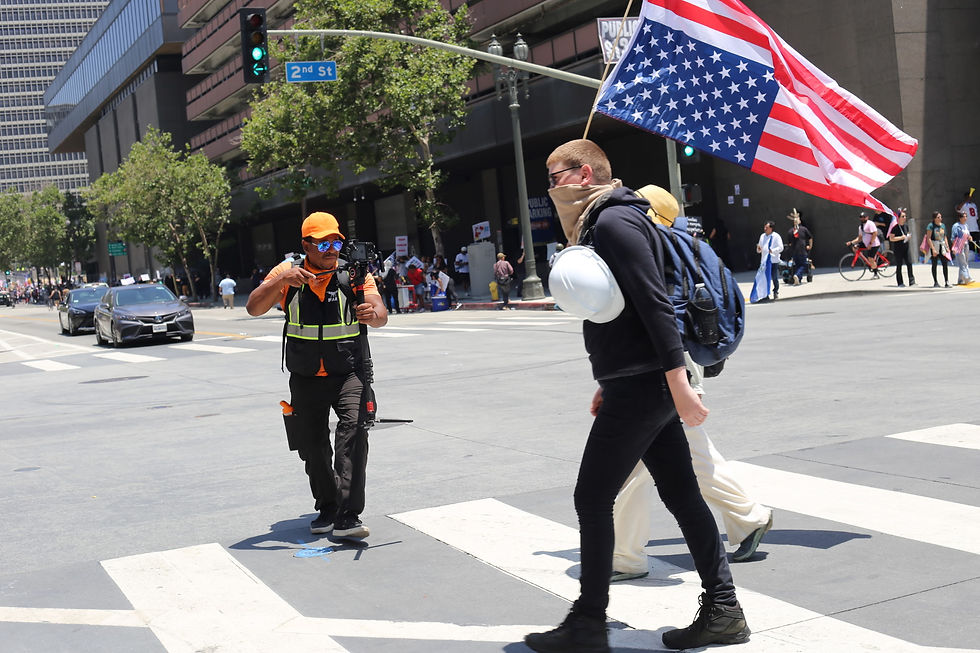An Inspiring Evening at the ASC: Learning from Squid Game 2's Kim Ji-yong
- dfflip
- May 29
- 3 min read

Last night at the American Society of Cinematographers, I had the privilege of witnessing something truly special - an intimate conversation with Kim Ji-yong, the cinematographer behind the visual mastery of Squid Game Season 2. What unfolded was more than just a technical breakdown; it was a masterclass in vulnerability, storytelling, and the power of perseverance.
Kim Ji-yong started the evening quietly, almost reserved. But as he began sharing his work and opening up about his journey, something magical happened. The room transformed. Here was a world-class cinematographer, responsible for one of Netflix's most visually stunning series, showing us his vulnerable side and making the entire audience laugh with his genuine humility.
His story resonated deeply with me. Coming from Korea to study at AFI, facing language barriers on set, and finding his place in an industry where communication seemed paramount - until he discovered that with the grips, words weren't always necessary. When he realized he doesn't speak English well and saw that grips didn't have to speak much on set, he said "I wanted to do that," drawing laughter from the crowd as he described gravitating toward the technical crew where language was less of a barrier.
The technical insights were fascinating. Kim Ji-yong chose the new ARRI Alexa 35 for its incredible latitude, explaining that cinematographers simply love working with new gear that pushes creative boundaries. Remarkably, he achieved those stunning visuals without using any filters, relying purely on the camera's capabilities and his lighting design.

His workhorse lens was the Angenieux EZ Zoom, and he primarily operated single camera because, as he explained, "you can only get one camera on the axis" - and he was that main operator throughout the series. Managing over 200 extras in the episodes he showed us, his attention to detail was meticulous.
One detail that surprised me was learning that the iconic red lighting in the Russian roulette scene wasn't just a creative choice - it was motivated by the actual building's exterior, which had red light illuminating it. This kind of practical motivation elevated the authenticity of every frame.
Kim Ji-yong's approach to lighting revealed his deep understanding of visual storytelling. For the game sequences, he tried to use practical lighting as much as possible, though he did supplement with Sky Panel 360s and 60s overhead. But what struck me most was how he differentiated between lighting the characters during the games versus outside of them - each requiring a completely different visual language.
His camera movement philosophy was equally thoughtful and refreshingly simple. During the Russian roulette scene, he would zoom in as actors moved forward and zoom out as they moved backward, timing these movements to coincide with the actors' movements, making every camera motion feel motivated and organic. What's remarkable is how he kept his key grips happy with an elegant approach - most of his camera movements were simply tilts and pans. Even when working on a jib, he would just tilt the camera. In his own words, "it just felt right." Sometimes the most effective techniques are the most straightforward ones.
The evening reminded me of something fundamental about success in our industry. Kim Ji-yong's journey from Korea to AFI to becoming the cinematographer of one of the world's most watched series wasn't just about talent - it was about timing, yes, but more importantly, about being willing to throw yourself into situations and figure it out as you go.
His biggest lesson resonated long after the lights came up: "If you want to succeed, you have to not let fear be your headwind but be your tailwind."
This is what I love most about ASC events - hearing these personal journeys from cinematographers who've reached the pinnacle of their craft. Kim Ji-yong's story is one of persistence, adaptation, and the courage to embrace vulnerability. It's a reminder that behind every stunning frame is a human being who faced their fears and chose to move forward anyway.
The ASC continues to provide these invaluable opportunities to learn not just about the technical craft, but about the heart and soul that drives great cinematography. Last night was a perfect example of why these conversations matter - they inspire us to push our own boundaries and remind us that success often comes from turning our greatest challenges into our greatest strengths.





Comments